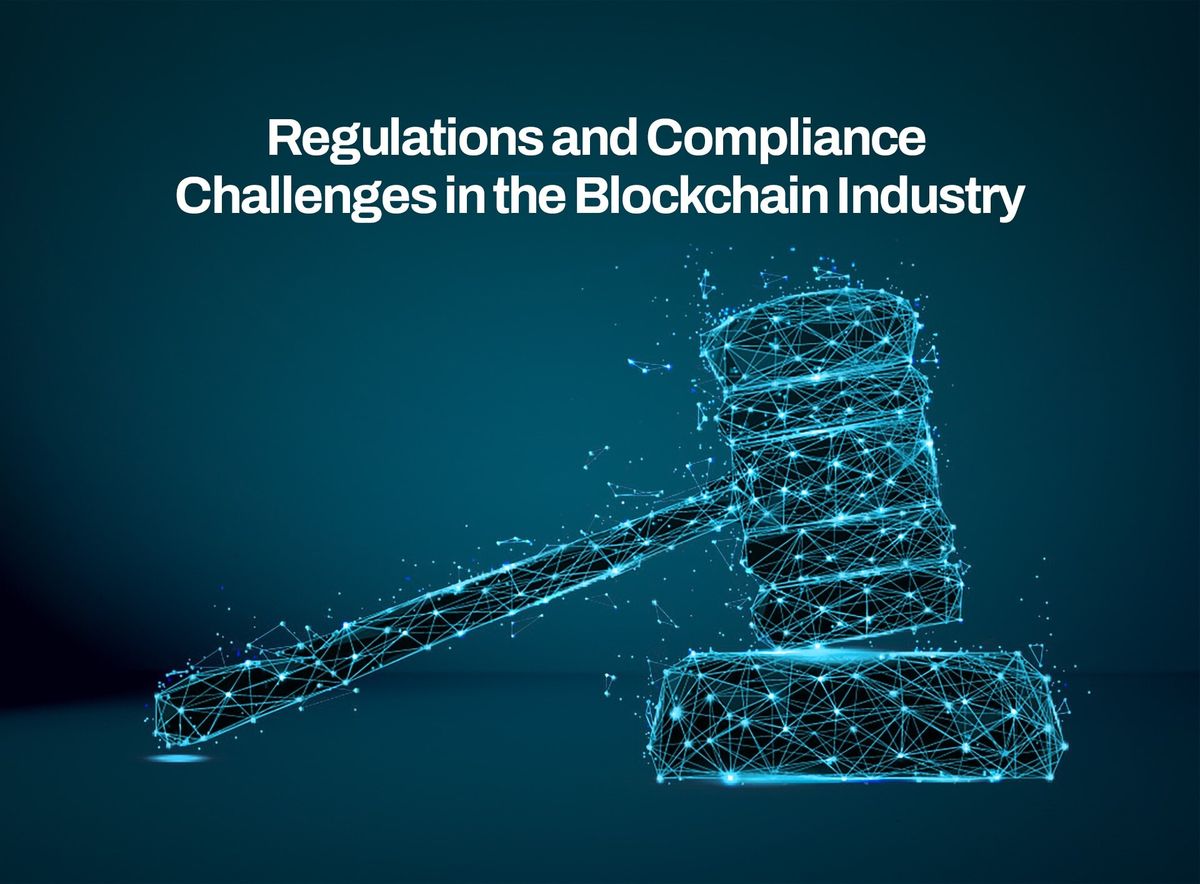Regulations and Compliance Challenges in the Blockchain Industry
From KYC rules to global compliance hurdles, discover the biggest regulatory challenges facing the blockchain industry and what they mean for crypto users and businesses.

Blockchain technology is changing the way businesses operate by offering security, transparency, and efficiency. From cryptocurrency transactions to smart contracts, its applications of Blockchain for businesses continue to grow. Alongside this rapid growth, regulations are becoming more important than ever.
For business owners and decision-makers, staying informed about blockchain regulations is essential.
Governments and financial bodies around the world are working to introduce rules that prevent financial crimes, protect investors, and maintain trust in digital transactions. While these rules promote fairness and security, they also create challenges that cannot be ignored.
Unclear global standards, shifting regulations, and legal complexities make it difficult for businesses to move forward confidently.
There are challenges in meeting financial regulations, protecting data privacy, and understanding how digital assets are classified. Each of these can impact how blockchain solutions are built and adopted.
Understanding these challenges and knowing how to navigate them is key for any business planning to use blockchain technology successfully.
Regulations and Compliance Challenges in the Blockchain Industry
Blockchain continues to evolve, offering new possibilities for businesses. However, regulatory challenges grow along with technological advancements. Businesses need to understand why regulations exist and how they influence blockchain adoption. Clear knowledge of regulations helps avoid mistakes and supports safe, long-term growth.
Why Blockchain Regulations Are Important for Businesses
Blockchain regulations play a vital role in shaping responsible growth and protecting the interests of all involved parties. Businesses that comply with regulations gain several important benefits.
- Regulations protect customers and investors by promoting fairness and safety in blockchain transactions.
- Following compliance rules helps businesses avoid legal penalties and costly mistakes.
- Strong regulatory practices build trust among customers, investors, and business partners.
- Regulations support financial stability by preventing fraudulent and illegal activities.
- Regulatory clarity encourages businesses to innovate within safe and well-defined boundaries.
- Complying with regulations improves the reputation of a business and attracts long-term partnerships.
- Regulations offer protection against financial crimes and support smoother international transactions.
An Overview of Blockchain Regulations Around the World
Blockchain regulations differ across countries, making it essential for businesses to stay aware of international policies. Understanding these variations helps businesses operate safely across borders and adapt to local requirements.
- The United States applies strict blockchain regulations through several agencies that focus on securities, commodities, and financial crime prevention.
- The European Union introduced a unified approach through the Markets in Crypto-Assets regulation to protect consumers and maintain business consistency.
- Singapore supports blockchain innovation with clear regulations that balance growth and security for businesses.
- Japan maintains well-defined rules for crypto exchanges and blockchain companies, creating a safe and transparent market environment.
- Some countries have not yet established clear blockchain regulations, leading to uncertainty and potential risks for businesses.
- Regulatory differences across regions make it important for businesses to develop location-specific compliance strategies.
- Understanding international regulations helps businesses avoid violations and build trust in foreign markets.
Key Regional Approaches to Blockchain Compliance
Each region follows a different approach to blockchain regulations based on local laws, financial structures, and business goals. Understanding these regional approaches helps businesses plan expansion and avoid compliance issues.
- In the United States, regulatory bodies like the Securities and Exchange Commission and the Commodity Futures Trading Commission oversee blockchain activities to protect investors and maintain market integrity.
- The Financial Crimes Enforcement Network in the United States monitors transactions to prevent money laundering and other financial crimes.
- The European Union introduced the Markets in Crypto-Assets regulation to standardize blockchain rules across member countries and create a secure business environment.
- Singapore is known for encouraging blockchain adoption by offering clear regulations that help businesses innovate without fear of legal problems.
- Japan regulates blockchain activities with clear guidelines that support both growth and consumer protection in the blockchain space.
- Businesses operating in multiple regions must understand and adapt to these varying approaches to avoid unexpected legal challenges.
- A clear understanding of regional regulations helps businesses build trust and expand operations with confidence.
Common Compliance Challenges in the Blockchain Industry
Compliance in the blockchain industry presents many challenges due to evolving laws and complex business models. Business owners need to recognize these challenges early to avoid setbacks and legal risks.
- Complying with Know Your Customer and Anti-Money Laundering rules is difficult when blockchain technology is built on decentralization.
- The classification of digital assets is often unclear, making it challenging for businesses to know whether an asset is considered a security, commodity, or utility.
- Taxation of blockchain transactions is complex due to varying international laws and the difficulty of tracking decentralized transactions.
- Data privacy regulations like the General Data Protection Regulation can conflict with blockchain's permanent and transparent nature.
- Rapid changes in local and global regulations make it hard for businesses to stay updated and maintain ongoing compliance.
- Building internal compliance teams can be costly and time-consuming for small and medium-sized businesses.
- Cross-border blockchain transactions face additional legal challenges due to differences in laws and financial reporting standards.
How Businesses Can Overcome Blockchain Compliance Challenges
Navigating blockchain compliance challenges requires a proactive and strategic approach. Business owners and decision-makers must adopt practices that help manage evolving regulations without slowing down innovation. Building a flexible and informed strategy can protect businesses from risks and open doors for safe growth.
- Staying informed about regulatory updates helps businesses adjust their operations before facing compliance issues.
- Developing flexible compliance structures allows businesses to quickly adapt to changes in local and international laws.
- Consulting with legal experts who specialize in blockchain regulations provides clarity and helps avoid mistakes.
- Partnering with compliance consultants allows businesses to stay updated and receive tailored advice for different regions.
- Using regulatory technology solutions simplifies the process of tracking and managing compliance across multiple jurisdictions.
- Training employees on compliance requirements reduces the chance of internal errors and improves overall business responsibility.
- Maintaining clear documentation of blockchain activities helps demonstrate compliance in case of audits or inquiries.
Conclusion
Blockchain technology offers new opportunities for businesses, but navigating regulations is a critical part of using this technology responsibly.
Compliance is not only about following rules but also about building long-term trust and stability. Businesses that understand regulatory frameworks can make better decisions and avoid risks that could impact their growth.
Regulations protect markets and encourage innovation by setting clear boundaries. Businesses that take compliance seriously position themselves as reliable and forward-thinking.
Understanding the global regulatory landscape also helps when selecting technology solutions or exploring services offered by top blockchain development companies, ensuring that solutions are built with security and compliance in mind.
Compliance is not a one-time effort but an ongoing process.
Businesses that keep learning and adapting to changing regulations can use blockchain technology effectively while maintaining trust with their customers and stakeholders. Recognizing compliance as part of business growth will help secure a stronger position in the evolving blockchain landscape.
Disclaimer: This article was written to provide guidance and understanding. It is not an exhaustive article and should not be taken as financial advice. Obiex will not be held liable for your investment decisions.

